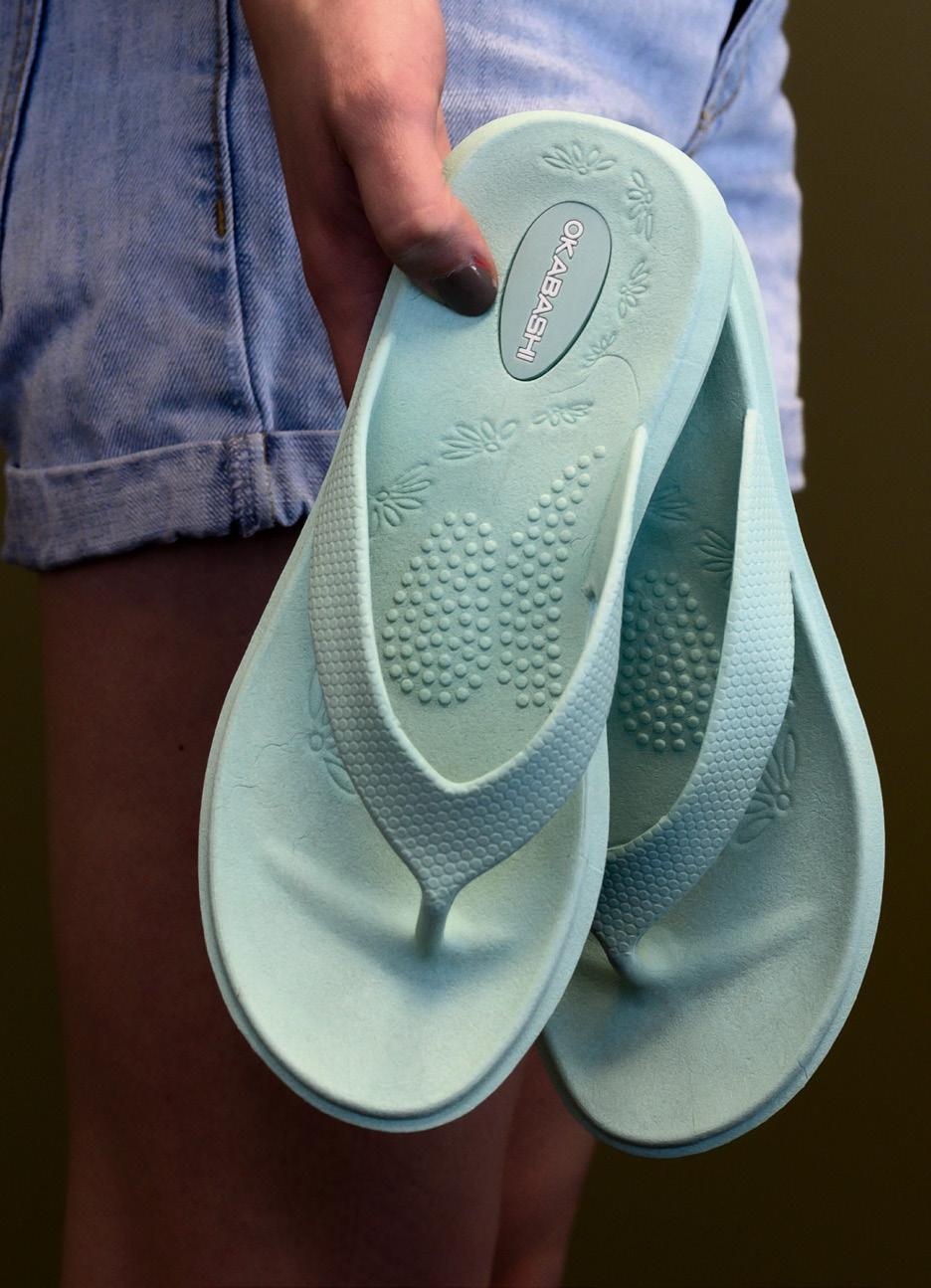
3 minute read
Soles of Soy
SOYBEAN OIL SUPPORTS ECO-FRIENDLY, MADE-IN-AMERICA FOOTWEAR
BY LAUREN HOUSKA
The typical flip-flop sandal is like the straw of the footwear world. It’s used for a short amount of time and then tossed.
But unlike the straw used to bed livestock that will decompose, discarded plastic and foam sandals are bound for oceans and landfills.
One U.S. shoe manufacturer has designed a shoe to solve this issue — and soybean oil is a major part of the solution. Durable and 100% recyclable Okabashi sandals are 45% U.S. soy by weight.
“Here at Okabashi Brands, we made the choice to go with a soy-based compound for our shoes because it aligns with our commitment to sustainability and manufacturing domestically,” says Okabashi President Kim Falkenhayn. According to the Georgia-based Okabashi — one of the remaining 2% of shoe manufacturers still operating domestically — less than 1% of shoes worn in the U.S. today are made in America.
But just like any business, the solution must also make logistic and financial sense. The company says soybean oil checks all the boxes for the footwear’s needs, allowing them to switch from a petroleum-based product to a biobased product that fits their brand better.
“There are a couple of things that make soybean oil a good fit for our plasticizer,” Falkenhayn says.

Photos: Joseph L. Murphy/Iowa Soybean Association
From farm to factory
April Hemmes, a soybean farmer from Hampton, says every little bit helps when it comes to driving demand for soybean oil. Hemmes is an ISA District 2 director and a director on United Soybean Board (USB).
“We’re entrusted to invest soybean checkoff dollars wisely,” Hemmes says. “So, while we still invest in tried and true markets, it is important that we also put dollars and resources toward new markets.”
For example, she says, biodiesel would not be the major market it is now without the significant investment of checkoff dollars and promotional efforts. Finding more uses like this one is a top priority for USB, she asserts.
“The versatile chemical composition of soybeans is driving a surge of soy technology,” Hemmes says. “Soybean oil is one of the most versatile natural oils, and I’m continuously surprised at how it can not only replace synthetic, less ecofriendly oils but it also can actually improve product performance.”
The molecular structure and fattyacid profile of soybean oil allows it to be readily modified for many applications, like the plasticizer in Okabashi shoes.
Currently, 200 employees produce roughly 1.2 million pairs of flip-flops and sandals a year for three brands:
• Okabashi, the flagship line, sold at drug stores and some specialty shops;
• Oka-B, a higher-end line for boutiques and spas; and
• Third Oak, currently available online and in select department stores.
When the soles eventually do wear out, customers can ship them back (for a discount on a new purchase), and they’ll be recycled into new pairs.
The company is pursuing an ambitious plan to increase sales across the company by 25% a year. To do so, the company must cater to a wider audience.
Okabashi is a wellness brand with typical buyers over 40 years old and concerned about comfort and foot health, not necessarily sustainability. To attract Millennial customers, Okabashi launched its Third Oak line, spotlighting a long-hidden virtue: Okabashi has been green since the get-go.
“Just like a lot like farmers, sustainability is ingrained in our DNA,” Falkenhayn says. “It’s so much a part of what we do and how we think about design. It must work holistically with all our processes to make it work in the end.”
Hemmes says soybean farmers can help companies like Okabashi reach sustainability goals from farm to factory.
“Consumers, especially younger generations, truly care about where their products come from and how they are made,” she says. “Companies recognize that and have taken notice of how we are producing soybeans sustainably, and they want to utilize our product.”
Contact Lauren Houska at lhouska@iasoybeans.com. The United Soybean Board contributed to this story.










